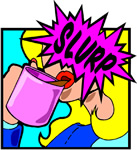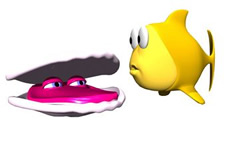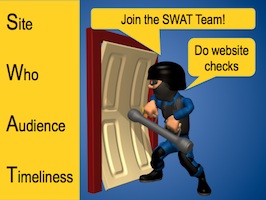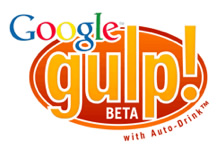Google Search Evaluation
Key Gaming Idea: Design motivating activities that compel students to evaluate information.
An important element of Google Search is evaluating the information that is found. Rather than trying to integrate all aspects of evaluation into one lesson, design a series of games or games with levels that look at different aspecs of evalution.
In her article Search Engine Results as the First Defense of Authority, Natasha Bergson-Michelson (2010) identified three issues that will motivate students to learn good search strategies:
- Their frustration when a click yields a page different from what they expected.
- Their intense desire not to feel brainwashed.
- Their passion for participation through voting for content.
Focus on just one aspect of evaluation rather than all the areas. Use the ABCDs to help students remember: authority & accuracy, balance, currency, and depth.
- Authority & Accuracy. Who sponsors the information? What does the URL tell you about the sponsor? What is the author or publisher's reputation? Are they credible? What makes the author an expert in this area: education, profession, hobby? What else has the author written? Can you find others who have cited this author? Design an activity that asks students to find out about the author or publisher of a page. Focus on "ABOUT THIS SITE" pages.
- Balance. Is the website objective? What's the purpose of the content? Is it for public service, education, or promotion? How do sources compare: do they complement or conflict with each other? Are various perspectives provided? Are the sources likely to be biased? How? Is the content balanced or does it advocate a particular perspective?
- Currency. Is the date of the content or website update clearly stated? How timely is the information based on the copyright or the dates cited in the article? How current is the information in comparison to other sources? Is currency important with this topic? Why or why not? How likely that information on this topic has changed recently or will change in the near future? Make comparisons among topics such as ancient cities information, cancer treatment information, and cell phone technology.
- Depth. Does the source provide an overview or surface level exploration or in-depth information? Are specific examples provided? Do the examples clarify the information? Are arguments provided and evidence cited? Are the sources for factual information cited? Can you verify the information found on the site through the citations?
Google Game Ideas
 SERP SLURP Challenge. Bergson-Michelson (2010) suggests that student frustrations begin when they click before they predict what they will find on a particular page. Rather than clicking down the page, she suggests teaching students to read the snippet and ask themselves to "what do I think will be on this page?" Students need to use the title, description, and URL in their prediction. Can you guess which site will contain the best information? Take the SERP (Search Engine Results Page) SLURP Challenge. In teams, students go to the same search. They each pick the page from the first page of results they think will have the best information. They write down their choice, but don't show the group). After looking at each page, each person votes on the best page. A person can't vote for their own page. Which page will you slurp? Pick the one that tastes the best! Will you slurp the snippet below?
SERP SLURP Challenge. Bergson-Michelson (2010) suggests that student frustrations begin when they click before they predict what they will find on a particular page. Rather than clicking down the page, she suggests teaching students to read the snippet and ask themselves to "what do I think will be on this page?" Students need to use the title, description, and URL in their prediction. Can you guess which site will contain the best information? Take the SERP (Search Engine Results Page) SLURP Challenge. In teams, students go to the same search. They each pick the page from the first page of results they think will have the best information. They write down their choice, but don't show the group). After looking at each page, each person votes on the best page. A person can't vote for their own page. Which page will you slurp? Pick the one that tastes the best! Will you slurp the snippet below?

 Werewolf Websites. Some websites look great on the outside, but once you start digging deeper you realize that they're not what they appear.
Werewolf Websites. Some websites look great on the outside, but once you start digging deeper you realize that they're not what they appear.
What looks like a pro-environmental website may turn into an advertisement for "clean coal". Students need to distinguish between different types of website such as forums, blogs, wikis, advertisements, and informational pages. This will help them determine the types of information that will be found on the page. When evaluating blogs, they can look at the profile of the author. On information pages, they can look for the ABOUT page. The key is getting students to think about who created the content and why.
 Sneaky Sponsors. Sometimes websites have a sneaky way to get you to the sales sites. Most students recognize the advertisements that appear along the side of web pages. However many may be missing the embedded ads. Ask students to look for sponsored links, sponsored sites, website partners, and other ads in web pages. Direct them to find a sneaky example of advertising that some people might miss. Ask them to think about why it's important to distinguish ads from other content. Print and post the sneakiest or most annoying ads. Vote for favorites and invent an award for the worst.
Sneaky Sponsors. Sometimes websites have a sneaky way to get you to the sales sites. Most students recognize the advertisements that appear along the side of web pages. However many may be missing the embedded ads. Ask students to look for sponsored links, sponsored sites, website partners, and other ads in web pages. Direct them to find a sneaky example of advertising that some people might miss. Ask them to think about why it's important to distinguish ads from other content. Print and post the sneakiest or most annoying ads. Vote for favorites and invent an award for the worst.
Forensic Science Infographic Game. Begin with an infographic and ask students to verify the content. Go to Forensic Science for a list of infographics. Choose one infographic and find three sources that confirm or refute some aspect of the infographic. Use a tool like Twiddla to write on websites.
SWAT Game.  Consider designing a set of criteria that fits the needs of your students. For instance, a media specialist in Ohio (Pete Hildebrandt) created the SWAT approach for his students (download the PowerPoint overview).
Consider designing a set of criteria that fits the needs of your students. For instance, a media specialist in Ohio (Pete Hildebrandt) created the SWAT approach for his students (download the PowerPoint overview).
Use a website like the American Museum of Natural History Ology pages to model this idea.
- Site. Examine the website itself. Look for government and museum sites. Think about the motives of nonprofit or company websites.
- Who. Think about who publishes the website. What is their expertise? How can they be contacted? Look for their ABOUT page.
- Audience. Who is the audience for the website? Is it students or adults? Is it biased?
- Timeliness. Look for information about the currency of the information. Is it new enough for your needs?
Use the PowerPoint presentation to get students involved in the theme. Then introduce the Google SWAT game.
Goal. Complete a series of website evaluation missions. Collect SWAT cards along the way. Level up by moving through the SWAT team ranks to become commander. Everyone could end up being a Commander!
Rules
- Rule 1. Each SWAT assignment must be completed on the official SWAT report form.
- Rule 2. SWAT members work alone unless they are required by their card to "call for backup".
Action, Attitude Feedback.
- Setup: Create a game board in the classroom. Each student begins at the Officer level.
- Directions: Take a Mission Card to determine your search topic. If your card says "call for backup" you need to work with a classmate. When you've solved the problem, submit your report to the Chief of Police. If the mission is successful, both students receive a SWAT card.
- Levels: Each completed SWAT card moves you up in rank from Officer to Detective to Sergeant to Lieutenant to Captain to Major to Colonel to Commander.
 Adapt one of these game ideas or create your own. Focus on specific evaluation skills. How will these skills be embedded in the game?
Adapt one of these game ideas or create your own. Focus on specific evaluation skills. How will these skills be embedded in the game?
Hoaxes and Fake Sites
 Students need to distinguish fact from fiction from fake. Unfortunately, most students aren't very concerned about accuracy, they're simply seeking an answer to a question or a funny photo to put on Facebook. Get them interested in asking themselves about accuracy.
Students need to distinguish fact from fiction from fake. Unfortunately, most students aren't very concerned about accuracy, they're simply seeking an answer to a question or a funny photo to put on Facebook. Get them interested in asking themselves about accuracy.
Learning to identify fiction, hoaxes and fake sites is an important skill. How can you tell?
Explore the Google Content fake sites.
- What questions do you have about the content?
- How would you find out if it's real or fake?
Google Fake Sites
- Google Copernicus Center
- Google Gulp
- Google's PigeonRank
- Google Romance
- Gmail Mail
- Gmail Custom Time
- Gmail Autopilot
- Gmail Motion
- Google Docs Motion
- Google Comic Sans
 Design an game that involves voting for your favorite Google Fake Site and inventing one for this April Fool's Day. Compare the Google Fake Sites with other fake sites.
Design an game that involves voting for your favorite Google Fake Site and inventing one for this April Fool's Day. Compare the Google Fake Sites with other fake sites.

